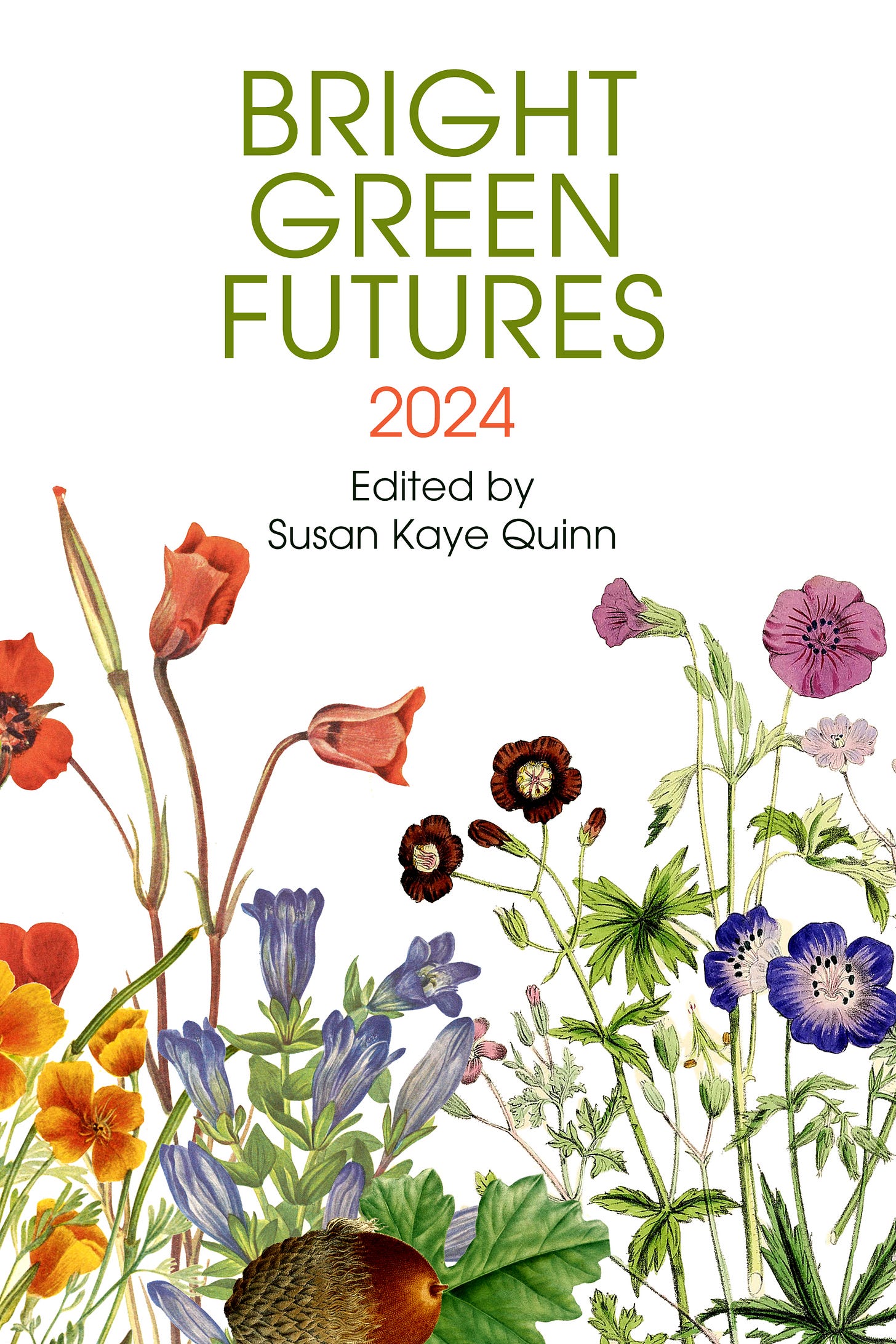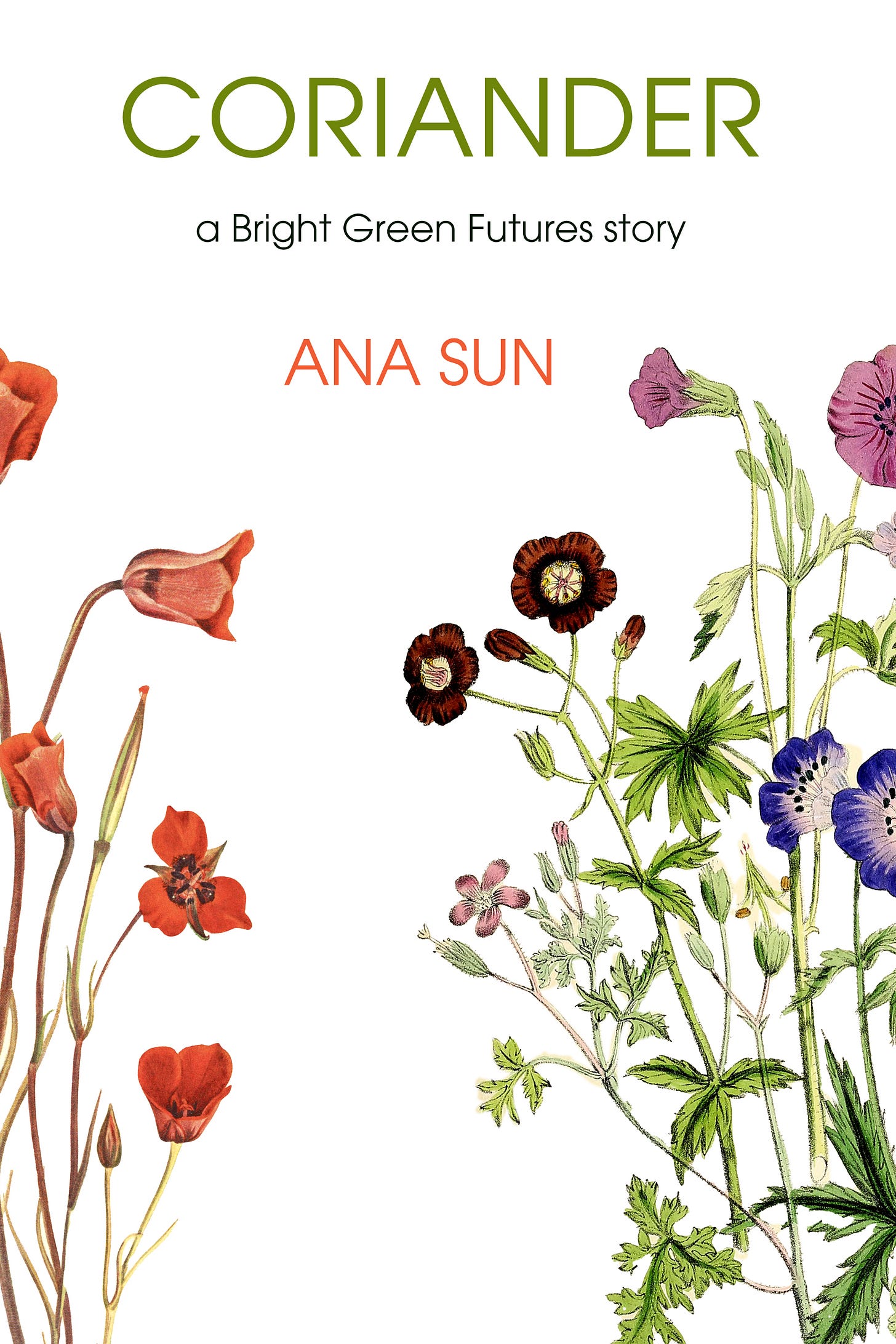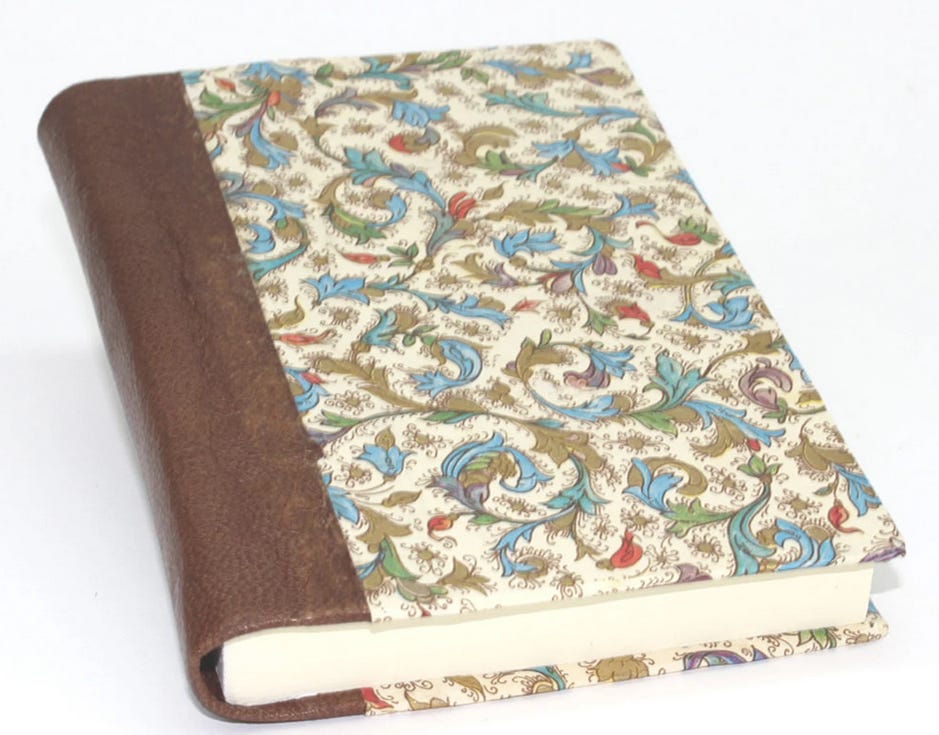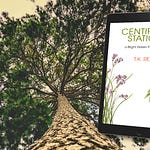In this episode, I chat with author Ana Sun about her story in the Bright Green Futures anthology, why she picked Climate Heritage as a theme, and her very fascinating giveaway item.
Text Transcript:
Susan Kaye Quinn
Hello friends! Welcome to Bright Green Futures, Episode 34: Climate Heritage with Ana Sun.
I'm your host, Susan Kaye Quinn, and we're here to lift up stories about a more sustainable and just world and talk about the struggle to get there. Today, we're going to have a quick chat with Ana about her story, Coriander, in the new Bright Green Futures anthology, which released on Earth Day.
But first, there are three things listeners should know.
One, the anthology is a collection of hopeful climate fiction stories from guests on the pod and is available in ebook and print. Now that it's released, you can request that your library carry it and that super helps with making it available to people.
Second, Ana's story is published separately as an ebook. And it's free right now. So make sure you go download that after the show or just get the anthology, which has all the stories plus a bonus prose poem.
And third, the giveaway will go until the end of May. Lots of cool stuff, handpicked by the authors, each item having a connection to their stories. So make sure to enter that as well.
Susan Kaye Quinn
All right, Anna, thank you for coming back to the pod.
Ana Sun
Thank you for having me back, Susan. Wonderful to be back.
Susan Kaye Quinn
I'm delighted to be in conversation with you again because we always have such interesting conversations. So I'm super looking forward to this. But let me start with saying I asked each of the authors in the anthology to pick a theme word, something that represented the story. And you picked CLIMATE HERITAGE, which is perfect. And as a side note, as soon as I read your story, I knew it be the perfect story to go at the end of the anthology. The story order is kind of a storytelling act itself. It kind of has a meta story that it tells simply through the theme words that each of the authors have picked. And yours, just like the theme word and the story itself just ended on the perfect note. And that expansive word heritage has just so much built into it and really speaks to what the story covers.
So why don't you read for us the one line description of your story and then tell us a little bit about how it speaks to heritage as a theme.
Ana Sun
So the one line description for my story is:
A cultural historian travels around the world to her great-grandmother’s birthplace and discovers traces that transcend time.
So in my story, Aster, who's grown up in a Western country, and we get the sense that her great grandmother may have immigrated a long time ago and therefore the entire sort of like the immigrant experience is in the backdrop of the story.
So she travels back to the city where her great-grandmother was born and tries to connect the dots between the memory she inherited through the family and what she experiences in the present day. I guess hopefully that's a good enough summary.
Susan Kaye Quinn
Yeah, no, that's great. The theme of notebooks as heritage as like, it is literally heritage or an inheritance, like those words are connected. And the memoir is, you know, belong to, was it her great grandmother or her great great grandmother? I can't remember. Now off the top of my head.
Ana Sun
When I first wrote the story, I actually wondered if there was a time and place where people would and should travel less, I guess. We see that notion of understanding what we scale back from. Particularly, let's say, if we no longer have commercial flights, I wanted to know what are the reasons someone would have to learn about other parts of the world and how we build up our knowledge around place. I want to say globalization hasn't entirely been good for all of us, but in the same breath, in this short amount of time of civilization, we've sort of built up tolerance and understanding of other cultures that are not ours, and I think it's supremely important. So guess the backdrop to this story also for me investigates that, like how do you not lose that richness?
Susan Kaye Quinn
It's such a great point too, because it's something I've been thinking a lot about lately is the juxtaposition of good things and bad things. And you encapsulate that in the globalization, the travel, which is killing the planet in some ways, but also is enriching culture and our understanding and appreciation of one another, which is important for coexistence and ultimately for sustainable living.
So, you know, having those two things coexist is emotionally difficult for us because we're like, we want things to be all good or all bad. And we want to be able to get, you know, very in high moral dudgeon about it. Like I'm fully against this because it's all bad. OK, but but we need to be mindful of what we lose and how to preserve that. And I think that's… a lot of people stall out at that point and they're like, just forget it. If I can't be like morally perfect, then you know, that's it. I'm out. I might as well just do everything terrible, you know, and it's like, okay, that's not the answer either. The answer is, you know, be mindful and and wrestle with the difficult things, which I mean, is so much what your character is doing in this story at a bunch of different levels. She's wrestling with difficult things for herself, for other people even. And I love that sort of richness in your story.
Ana Sun
I actually found this story really difficult to write, particularly because I like… I take inspiration from real places in my story. So sometimes if you pick up some clues, you can actually tell where my brain was at when I wrote a particular story and they're real cities. And so when I write solarpunk stories, I have to reckon with the fact people still live there and think about how do we transcend the challenges that are coming.
In places like these… so this particular town city is set very much in Southeast Asia. And it's not only there that I'm thinking of, but historically humans have built our towns and cities near rivers, deltas and other waterways for good reasons. There's a lot of resources, natural resources there. And it's a certainty that many of these places will be flooded in some form or already have been flooded in some form because where they are located relative to sea level and already coastal villages have lost land, we know that. But one of the things that was interesting to me is heritage as a movement that exists right now and certainly in the corners where I'm exposed to, because I'm in certain discussions and groups that look at this stuff, it concerns itself with preserving relics of the past. And I think that's all well and important, but it's so rare that I hear it discussed in terms of preserving heritage in the context of climate change.
And that's also one of the backdrops I wanted to investigate in this story. It’s actually a question that's been on my mind for several years. And I looked into like architecturally, how do you lift buildings that have been built like three, four hundred years ago off the ground and you can't do it. Which is why in this story I've given it a different treatment and give it a different place. And maybe in itself it becomes a new heritage going forward. So yeah. This is the sort of stuff that bothers me. It doesn't exactly keep me awake at night, but sometimes it does.
Susan Kaye Quinn
It's because you're actually engaged with it. You're actually grappling with the meaningfulness of it, which it comes through so great in your story. Obviously writers have to do that work first before we can put it in the stories, right? So I deeply appreciate you doing that work. Like this is just something I'm really concerned and interested in thinking about…there's so much intersection of climate change and X that we just don't think about. We barely think about climate change, much less the intersection of it in all these different levels.
It's so funny to me how a lot of these sort of reactionary pressures we see right now, reactionary forces are trying to go back or trying to freeze time and not go forward. And it's like, it's all changing. None of y'all can stop it. It is just like a fact. And we are living through… I was just telling this to Tory Stevens who's the creative manager at Grist for Imagine 2200, we were having this really great discussion. And I said, I really believe we're going through a huge cultural change moment right now. And when you're in it, you don't really know what you're in. It's hard to see what you're losing, even as you're losing it… sometimes it's obvious, right? Like when you're losing human rights, that's pretty obvious. But other things you may not realize until like it's kind of slipped away. And so I think this is really important work that you're doing through your storytelling of saying, hey, let's be mindful. Let's look to past things that we may have already lost or are in process of losing. And what is meaningful about those and how do we preserve that and what are we willing to do? What can we do? Against the rising waters, what can you do? There's so some practical limits to stuff.
Deep thinking about it, this is what stories and culture does. It's us grappling with reality and the world and ourselves. And I just love your contribution. People, have to go read it. Which again, you know, Ana's story is free this week and I do this intentionally. This is the final story in our little spree that we're doing of podcasts about the anthology. And each week I have been setting one story free so that people can just very easily access, get a taste, see what it's like. And each of your stories are so unique and touch an interesting different part of this larger solarpunk genre, but really just the cultural moment. And I really encourage people to get the whole anthology for sure, but take advantage of that free story if you're not quite sure. Just do it. Just try it out. You will not be sorry. All right.
Is there anything else you wanted to tell us about the story before I get to your giveaway item, which is also extremely cool?
Ana Sun
I think I might have to stop here because otherwise I'm going to give things away so it's probably best not to. I'll leave on space for readers to hopefully enjoy it.
Susan Kaye Quinn
That's so true. It's so true. I have struggled with each of these episodes to not just like go into all the things because I don't want to spoil the stories.
So let's talk about the giveaway item. Okay, so yours is very cool. It's these cool notebooks. And I'm just going to read the description of the notebooks here.
The gold accented paper used for the cover is from Florence Tuscany. It depicts traditional Florentine motif. This one is called Medicea. And it is inspired by the influential Florentine family, the Medici.
Did I say that right?
Ana Sun
I tend to think of it as Medici, but I'm not entirely sure.
Susan Kaye Quinn
Medici. That sounds much more Italian. So I'm going to say you're probably right on that. OK, so this is so cool.
And I think it fits wonderfully with your cultural heritage character. But there's also notebooks featured in the story itself, which is not a spoiler too much because we already said there's this memoir. And I think it's required for every writer to be a little in love with notebooks, just sort of as a writerly technology. But are there any special inspirations that you connected to these ones or why these particular notebooks for your giveaway?
Ana Sun
So, what's called the story, but the moment that that particular notebook showed up in the story. And sometimes when you're writer, you don't anticipate these moments and sort of influences in your own life that randomly shows up on the page, you know, near the end of the story. So for me, this particular reference is many, many years ago, a friend of mine who actually lived for a time in Italy, we met in Canada, of all places.
She gifted me some Florentine stationary and there was this beautiful object that I did not want to use for the longest time. I only use it for special occasions. And it was of a quality that I've never encountered up to that point and I was just so smitten by it. I guess it's one of those things if you're fortunate about having had the luck and the chance to live on different continents, you kind of have an appreciation for where things come from, the history of objects and this notion of like local craft and specialty. And so it's a part of me that I guess mourns what we may lose going forward, like these old techniques and technologies that underpin culture and they're really really small things. Things like how to make paper, making glass, and certain places do it better than others. Things that make us who we are.
So yeah, although obviously like you know we might not today agree with the kind of power structure that used to exist in Florence, but the Medici contributed materially to the Renaissance which enabled thought, art and architecture to flourish.
There was also a time where humanists believed that everybody should be able to speak and write and sort of level the playing field in terms of education so that individuals would be capable of engaging in the community in a meaningful way in sort of the citizen and sort of the civil level of engagement, which I thought was, I didn't know that about the history and it delighted me to find out about that. So, yeah, I guess there's multiple meanings for this particular giveaway, but really quite simply, it was a friend of mine who gave me this beautiful stationery and just made me appreciate that different places had different craft and heritage.
Susan Kaye Quinn
That's so lovely. And I love how the simple beauty of something can sometimes just draw you in and make you think, you know what, I need to know more about what this is and where this came from and how it came to be. I think that's also a really interesting part of solarpunk as a lifestyle or just sort of a general cultural moment of where we're sort of bringing back crafts, like fiber arts, papermaking, all these kinds of things that we would associate with a much earlier time in our technology as a human species are coming back because they're very grounding, they're very hands on, people get a lot of pleasure from them, they can be very subversive to the established order. If you go into these communities, they often are very subversive, and very solarpunk aligned. And I really like that connection of, hey, let's go back and understand where these technologies came from and pull forward the better part. We can leave all the bad stuff behind, right? And just pull forward the parts that are wonderfully human and engaging and are part of the better part of us, you know?
I feel like that's what we have to do in a lot of ways—take the better part of us and pull it forward because those other parts are how we got here. It's causing a lot of the problems.
Well, I'm going to I'm going to call it quits on this even though I would love to go on and on about this all day and get to our end question that I ask everyone.
What are you doing in these crazy times to stay grounded and keep working for a better world? And I know you're working in lots of different arenas. And I keep asking this question for every podcast episode and I always get the most interesting answers because everyone has their own way. So I'm very curious to hear what you're doing these days.
Ana Sun
I'm learning to get better at doing things for myself when I need quiet and balancing against what I can do for the world around me. Funnily enough, or maybe not so surprising, when I need to be quiet, I do a bit of crochet and knitting, mostly for gifts for people I love. And maybe this speaks to the heritage bug in me, because when you learn to make things by hand, you do realize that these techniques go back a very long time. And knitting, for example, has such a fascinating history. You hear terms like the Italian bind-off technique or the German short row and you think like once upon a time we have exchanged these techniques to help us make better garments or whatever technical reason why we want to do things a certain way. I'm also… I don't know, I must do this in side by side. I've made it my personal goal last year to learn how to be funny.
Susan Kaye Quinn
How to be funny! You are already funny, but go on.
Ana Sun
Writing humour turns out to be quite difficult. There's a couple of my stories that have come out or coming out that sort of like, where I lean into the skill I'm trying to build up to trying to be funny. I think, well, Coriander, unfortunately, it's not exactly a funny story, but I want to be more intentional about it. Because I think it's one of those ways of coping with the current world we live in that I need to learn how to use this skill. Again, it's a craft.
Susan Kaye Quinn
Absolutely.
Ana Sun
So the second half of your question, keeping working for a better world, I've actually been spending less time online intentionally and more time involved with local activism. For example, in one project where we're building up the community case for a right to river application for one of our streams, that's really hugely exciting. I'm buzzed every time I talk about this. And also separately, I'm working alongside like-minded colleagues on a community project to sort of create space for residents of a particular area to interrogate and imagine their preferred futures in place in London. Doing quite a lot of local work and just trying to pull myself offline and make sure that my energy goes to the right places.
Susan Kaye Quinn
Oh, that is so great. And I think a very strong impulse that all of us have, or a lot of us have right now of working local. And that's a way of grounding. You just get away from the crazy online stuff and go where you know you can make an impact and just be in the world. So I love hearing that. Thank you for sharing.
And thank you for sharing your story with the anthology. And I'm just so excited for people to be out there and reading it. So thanks for coming back.
Ana Sun
Thank you so much. I'm very glad that you like the story and that you chose to include it. So much appreciated for doing all the work that you do, Susan. Thank you so much.
Susan Kaye Quinn
My absolute pleasure. Thanks.
That wraps up our mini series with each of the authors of the anthology. It's truly a pleasure and an honor to publish these writers and their stories. As I've said many times, we need a million of these kinds of stories out there, stories that help us imagine a future worth fighting for. And this anthology is one of the ways I'm trying to make that happen. You can help by picking up a copy.
And when you're done with it, share it with a friend or drop it in a little free library. Request that your local library carry it. You can also help by downloading the free Bright Green Future zine and sharing it with your friends, especially if they're struggling in these difficult times. As always, subscribe to the podcast and the newsletter for more stories to light the way forward.
In this series of episodes, we'll have each of the authors of the anthology on to talk about their story, their theme, and their giveaway item. The links for everything are below. As a quick review, the six themes for the six stories are:
CLIMATE ANXIETY
CLIMATE RESTORATION
CLIMATE ROLES
CLIMATE CONNECTIONS
CLIMATE RESILIENCE
CLIMATE HERITAGE
They fit together almost like a meta story, and the themes and the stories showcase what hopeful climate fiction can look like and the breadth of what we need to tackle.
Pre-orders boost the visibility of the anthology, so please do that if you can.
Anthology Giveaway
That giveaway will be ongoing until the end of May.
Check out the Featured Stories and Hopeful Climate Fiction lists.
LINKS Ep. 34: Climate Heritage with Ana Sun
Ana’s story (FREE until 5.29.2025): Coriander
RELEVANT NEWSLETTERS
Ep. 27: Zines, Cultural Change and Storytelling in the Underground
Ep. 30: Earth Day, Joy as a Tactical Weapon, and Release Day for the Bright Green Futures Anthology
PLEASE SHARE
These hopeful climate-fiction stories include clicky space centipedes, sentient trees, a flooded future Rio de Janeiro and characters trying to find their place in a climate-impacted world. Each story imagines a way for us to survive the future, together.
Bright Green Futures: 2024 contains six short stories plus a bonus prose-poem.
The Doglady and the Rainstorm by Renan Bernardo
What Kind of Bat is This? by Sarena Ulibarri
Centipede Station by T. K. Rex
A Merger in Corn Country by Danielle Arostegui
Ancestors, Descendants by BrightFlame
The Park of the Beast by T. K. Rex
Coriander by Ana Sun





















Share this post